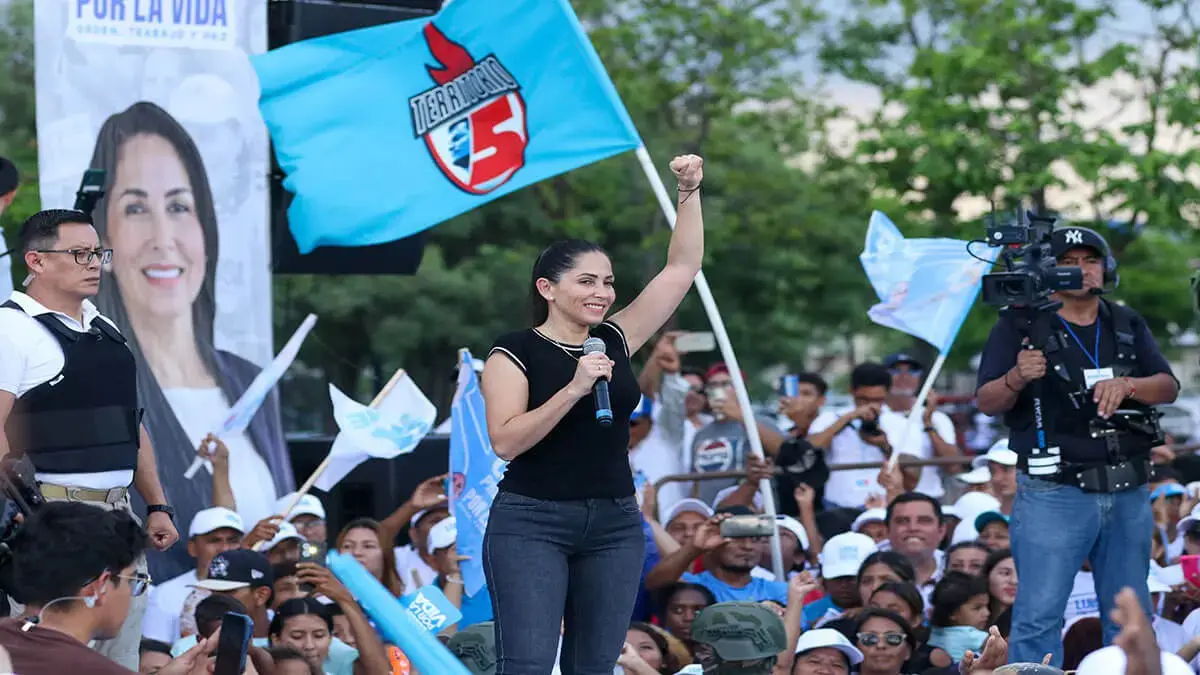Ecuadorians Vote Amid Phone Ban, Fabricated Threats, and State of Emergency

A special forces police officer in Ecuador, April 2025. X/ @SputnikMundo
April 13, 2025 Hour: 1:27 pm
Restrictions on civil liberties can be used to sway the vote in favor of President Noboa, human rights defenders denounce.
On Sunday, over 13.7 million Ecuadorians were called to participate in the second round of a presidential election marked by allegations of irregularities that could tip the scales in favor of right-wing President Daniel Noboa, who is seeking reelection and aims to defeat Citizen Revolution candidate Luisa Gonzalez.
RELATED:
Ecuador: Candidate Gonzalez Votes in Hometown, Highlighting Grassroots Support
Amid accusations of fabricated threats, unjustified states of emergency, and last-minute changes to polling stations, the process has been overshadowed by practices that social organizations and international observers describe as authoritarian.
On Saturday, Gonzalez raised alarms by denouncing operations coordinated by the Noboa administration to place fraudulent electoral records at various polling sites across the country. She revealed that sources within the National Police and the Armed Forces warned her about this potential fraudulent maneuver.
“They are trying to fabricate a narrative of fraud in the face of Noboa’s imminent defeat,” Gonzalez stated, warning that such actions “will destroy what little democracy Ecuadorians have left.”
This tactic of “fabricated threats” is aimed at delegitimizing the results of an election that may not favor Noboa. For this reason, Gonzalez urged security institutions not to collaborate with a strategy that seeks to use state institutions to manipulate the elections— a practice that international organizations have condemned in other countries in the region.
Threats of Rights Suspension to Intimidate Voters
On Saturday, less than 24 hours before the elections, Noboa issued Decree 599, imposing a 60-day “State of Emergency” in Guayas, Manabi, Los Rios, Santa Elena, El Oro, Sucumbios, Orellana, and Pichincha—eight provinces where Noboa could face a significant defeat.
The decree suspends constitutional rights such as freedom of movement, freedom of assembly, and the inviolability of the home. It also authorizes the Armed Forces to act as a “security force” during election day.
Local analysts noted that the declaration of a “State of Emergency” lacks a real basis, as those eight provinces are not experiencing new violent incidents. Human rights defenders pointed out that Noboa’s decree violates international standards, including Article 27 of the American Convention, which does not allow for the criminalization of citizen mobilization during an electoral process.
“This isn’t about security; it’s an operation to control the election,” denounced Citizen Revolution activists, accusing Noboa of using the Armed Forces to intimidate voters in opposition strongholds.
The National Electoral Council Under Suspicion
In recent weeks, the National Electoral Council (CNE), led by Diana Atamaint, has been heavily criticized for decisions that affect transparency and access to the vote. Among them is the ban on using cellphones to take photos of the ballot.
While the CNE argues that its decision aims to guarantee the secrecy of the vote, citizens criticize the cellphone ban because it limits their ability to document any irregularities in real time.
“They changed the rules halfway through, catering to one side of the contest,” said an electoral observer from the European Union, who criticized the lack of consensus within the electoral authorities.
Just hours before Sunday’s elections, the CNE relocated 24 polling centers, citing “rain” as the reason. Leonidas Iza, former presidential candidate and leader of the Confederation of Indigenous Nationalities of Ecuador (CONAIE), warned that the relocation would cause confusion among rural voters and prevent them from voting in time.
Recently, public officials also reported being pressured to attend mandatory “training sessions for electoral control,” which allegedly aim to favor Accion Democratica Nacional (ADN), the party controlled by President Noboa.
Citing logistical and organizational delays, electoral authorities also suspended voting for 10,000 Ecuadorians living in Venezuela. This decision affects migrants in a country with a strong presence of Citizen Revolution supporters.
Ecuadorian Elections Raise International Alarms
The Electoral Observation Mission of the Progressive International expressed concern over restrictions on vote scrutiny. In a letter to CNE President Atamaint, they demanded guarantees that witnesses be allowed to document the process, as required by Inter-American standards. “Without transparency, there is no legitimate election,” they warned.
These irregularities occur in a regional context where leaders like Nayib Bukele in El Salvador and Javier Milei in Argentina have eroded institutions under promises of a “firm hand.” In Ecuador, Noboa appears to be following the same playbook: destabilizing electoral processes, criminalizing opposition, concentrating more power, and seeking support from the United States.
On Saturday, American artist Mark Ruffalo also warned about the possible interest of the White House in manipulating Ecuador’s elections to consolidate its regional allies.
teleSUR/ JF
Source: teleSUR – EFE – Pichincha Comunicaciones






